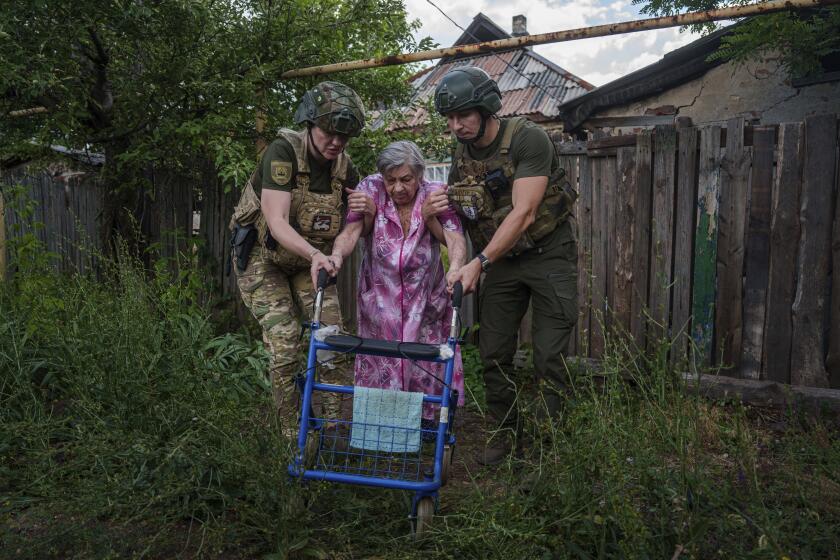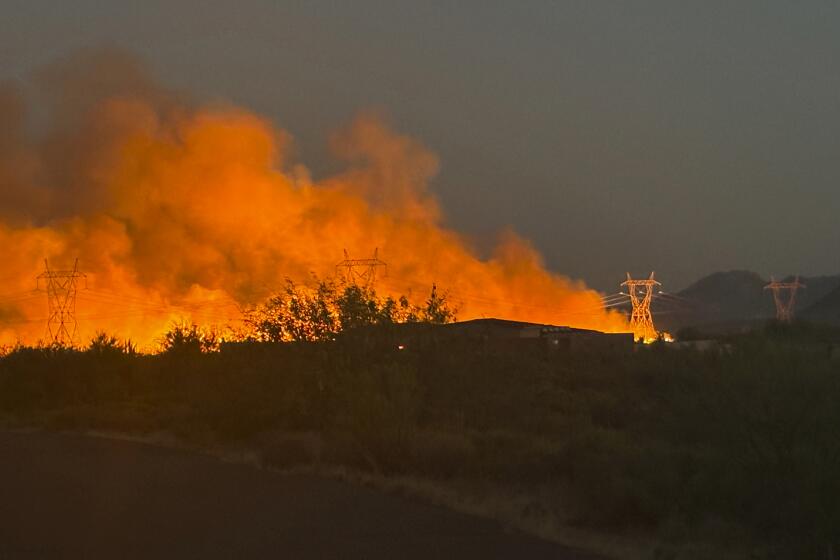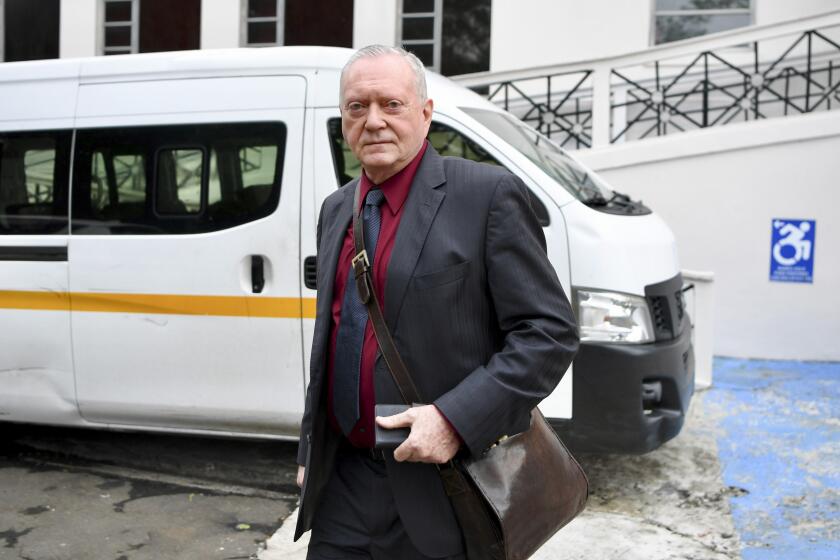Scouting, Snuffed Out in ‘20s, Rekindled in Russia : Youth: Soviet disciples try to avoid pitfalls as they set about resurrecting the once-banned movement.
Combing through the archives of the V. I. Lenin Library, a disenchanted Communist youth worker unearthed a once-banned book that he now hopes will change Russia’s future.
The book was long denounced by Soviet officials as “bourgeois,” and its author, a foreigner, had once spied against Russia.
With the advent of communism, those who tried to preach the book’s message risked prison, even execution. No less a figure than Nadezhda Krupskaya, Lenin’s wife and a respected socialist in her own right, worked to counter its influence.
The book was “Scouting for Boys” by Sir Robert Baden-Powell.
It was in 1987 that Vyacheslav Chernikh, now 23, got his hands on a copy of the 1908 work that gave birth to the worldwide scouting movement. Driven to learn everything he could about scouting, the history major searched libraries and contacted relatives of boys, now long dead, who were scouts when Russia had a czar.
The Russian scouting movement, like so many institutions here, perished with the old regime. With the exception of clusters of emigre youth in America and elsewhere, it has been dead for more than 60 years. But Chernikh and 90 like-minded people from across Russia are determined to resurrect scouting, saying tomorrow’s Russia needs it.
“All our economic problems, in my opinion, arise from the fact that so many generations in our country were brought up on Communist ideals,” Chernikh, a straight-talking, tousle-haired native of the Volga Valley, said recently. “For the economic reform of Russia, there must be people with a new upbringing, who have been raised in a new spirit.”
For three days starting Thursday, probably in an auditorium at Moscow’s Youth Institute, scouting’s Soviet disciples--many of whom, like Chernikh, were once dissatisfied leaders in official youth organizations--will gather to merge independent local groups that already have more than 5,000 members into what is tentatively called the Russian Union of Scouts.
Attending will be leaders and young members of the Tomsk Stranniki, or Wanderers, who wear black berets, scouts from the Crimean city of Simferopol, the “First Scout Troop” (and the only one) from Tyumen--and Chernikh, who wears a Polish scout shirt and received the rank of “instructor” from Polish scouts whom he befriended while a student in Moscow.
Delegates will debate a charter and texts for the Scout Law and Scout Oath. It is a document that, after seven decades of Communist-orchestrated youth campaigns for peace, the Five-Year Plan and other Kremlin causes, seem as quaintly passe as Russian scouting’s traditional hero, St. George the dragon slayer.
At first glance, the turmoil of the perestroika years would appear to ensure Russian scouting’s future. Some young men here now speak of skauting with the same respect that other Russians use when talking about the Orthodox Church of their ancestors.
“When one has been a scout, it seems to me one is a scout for his whole life,” said one Moscow teen-ager working with Chernikh.
Scouting will also profit from the plummeting popularity of the Communist Party, which has stunned the 28-million-member Komsomol Youth League and left it, like the parent party, groping for a new role. Likewise, the red-kerchiefed organization for youngsters, the 18-million-strong Pioneers, has shed Lenin’s name and is searching for ways to keep perestroika- era boys and girls in its ranks.
However, the new-found readiness of Komsomol and Pioneer leaders and salaried functionaries to renounce once-sacrosanct principles of “socialist upbringing” poses a threat to emerging Russian scouting. Nothing now prevents them from starting “scout troops” of their own and laying claim to the heritage of Baden-Powell, and some of their leaders reportedly plan to do just that.
Far worse, the xenophobic group Pamyat, which blames Russia’s problems on Jews and foreigners, has been considering whether to form its own youth detachments and has been looking at scouting as a model. So has the Defense Ministry auxiliary that teaches schoolchildren how to don gas masks and crawl through trenches in preparation for military service.
“Everywhere you turn today, you hear the word scout ,” Chernikh complained. “I already have nightmares about some retired major ordering a Russian scout troop into formation, with the traditional drill, ‘Up! Down! Up! Down!’ ”
The World Organization of the Scout Movement, the Geneva-based coordinator of boy scout movements in more than 150 nations, is another variable in the equation. Its director, Jacques Moreillon, was scheduled to be in Moscow to talk to Soviet officials who handle youth affairs. He prolonged his trip to see what Chernikh and his associates do.
Contacted recentlyby telephone, Moreillon would say little publicly.
“I really need to see on the spot a number of things before I take clear options,” he said.
But Russian scouts already fear that Moreillon’s organization, which would determine which Russian group has the right to call itself “scouts,” may be tempted to shun their small-scale, often poorly equipped operations in favor of big, rich organizations that have millions of members--such as the Pioneers.
They cite signs that they find worrisome. For example, when the Soviet Union was represented at the 32nd World Scout Conference in August, it was by Albert Likhanov, chairman of the Lenin Soviet Children’s Fund and a Communist Party member, and not by a Russian scout.
He carried the following message from President Mikhail S. Gorbachev: “It is good that Soviet youth has had the possibility to get acquainted with the scouting movement, mutually casting off old prejudices and mistrust.”
Gorbachev’s salutations, and the attempts to re-establish Russian scouting, mark a bizarre turn in Soviet history. Few subjects once provoked more hostility among officials here than scouting and its founder, who first came to Russia in 1886 as a British officer spying on the czarist army.
Scouting, the 1976 Great Soviet Encyclopedia declared with venom, “has a clearly expressed political, militarist and religious bent; it attempts to move the young generation away from taking part in the fight for revolutionary and democratic transformations.”
Little wonder, then, that Lenin and his Bolsheviks moved with such determination to eradicate the Russian youth movement that began in 1909 when an army captain created a troop of seven boys in a village near present-day Leningrad, and that grew to 50,000 members within eight years.
Despite the boy scouts’ avowed political neutrality, the majority of Russian scoutmasters, including the founder of Russia’s first troop, Oleg Pantyukhov, threw in their lot with the anti-Communist forces in Russia’s 1917-1921 civil war.
Scouting seemed to the Bolsheviks to be an arm of counterrevolution, and although attempts were made to create “red scouts,” the followers of Baden-Powell became the resented rivals of the Communists’ own Komsomol, which was founded in 1918.
Scouting’s lure, however, was undeniable, and Krupskaya, who helped develop Soviet youth policy, recommended taking from Baden-Powell what “irresistibly attracts young people.”
Consequently, when the Pioneers were formed in 1922 for children between 10 and 14 years old, they took scouting’s troop structure, neckerchief, campfires, passion for knot-tying and even the motto “Be Prepared.”
Scouting itself in Russia was snuffed out in the 1920s, with about 1,000 leaders reportedly arrested in 1923-1926 and many sent to die at the labor camps of the gulag, including the notorious prison on the Solovetsky Islands.
Now, the dangers to Russian scouting are of a far different order. In June, the Group for the Rebirth of Russian Scouting, which is organizing the Moscow congress, asked for the Supreme Soviet’s aid. It was offered the help of the legislature’s Committee on Youth Affairs but rapidly found it a mixed blessing.
“Everybody wants to exploit scouting, to travel abroad, to get things,” Chernikh said. One Soviet organization--he would not say which--offered to pay for Russian participation at an international jamboree in South Korea, provided its representatives received 10 of the 20 slots so they could go to Seoul to try to negotiate trade deals while the scouts met around the campfire.
With a spirit of self-reliance that “B.P.” might well have admired, the leaders of Russian scouting’s rebirth have now decided to go it alone, without government help.
“Every time we ask for assistance, we’ve seen how this leads to pressure on us,” Chernikh said. “I think that if we have 50,000 good scouts across Russia in five years, it will be a great success.”
More to Read
Start your day right
Sign up for Essential California for news, features and recommendations from the L.A. Times and beyond in your inbox six days a week.
You may occasionally receive promotional content from the Los Angeles Times.






